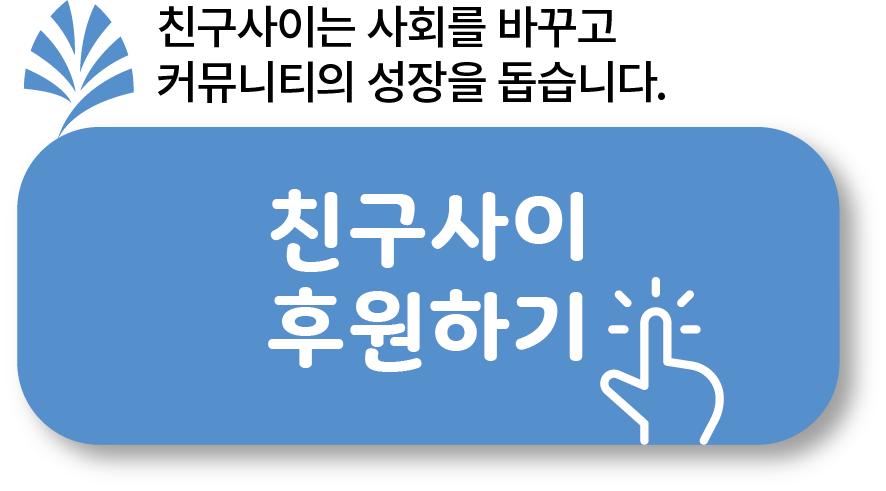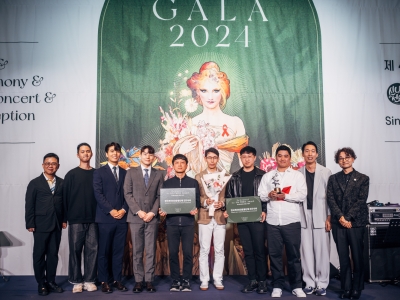| 기간 | 5월 |
|---|
[활동스케치 #4]
미국 콜로라도대학교 덴버캠퍼스 정치학과 종로3가 답사
2024년 5월 26일 정오, 미국 콜로라도대학교 덴버캠퍼스 정치학과 토니 로빈슨(Tony Robinson), 지민선 교수와 소속 학과 학생들이 종로3가를 방문하여, 한국 게이커뮤니티의 역사가 서린 주요 장소를 답사하는 일정을 가졌습니다. 답사 인솔은 친구사이 사무국장과 소식지팀장께서 진행해주셨고, 통역은 지민선 교수께서 수고해주셨습니다. 당일 배부된 국·영문 답사지의 전문을 친구사이 소식지에 공유드립니다. 관심있는 분들의 일독을 권해드립니다.
| * 이 글은 다음 두 글의 내용을 발췌·수정·증보한 것입니다. - 김대현, 「종로3가 게이 게토와 게이커뮤니티의 위치」, 『친구사이 소식지』 99, 한국게이인권운동단체 친구사이, 2019.9. - 김대현, 「종로3가 게이 게토의 역사와 게이커뮤니티의 형성」, 『선게이서울 : 지보이스 스토리북 창단 17주년 특별판』, 한국게이인권운동단체 친구사이, 2019. |
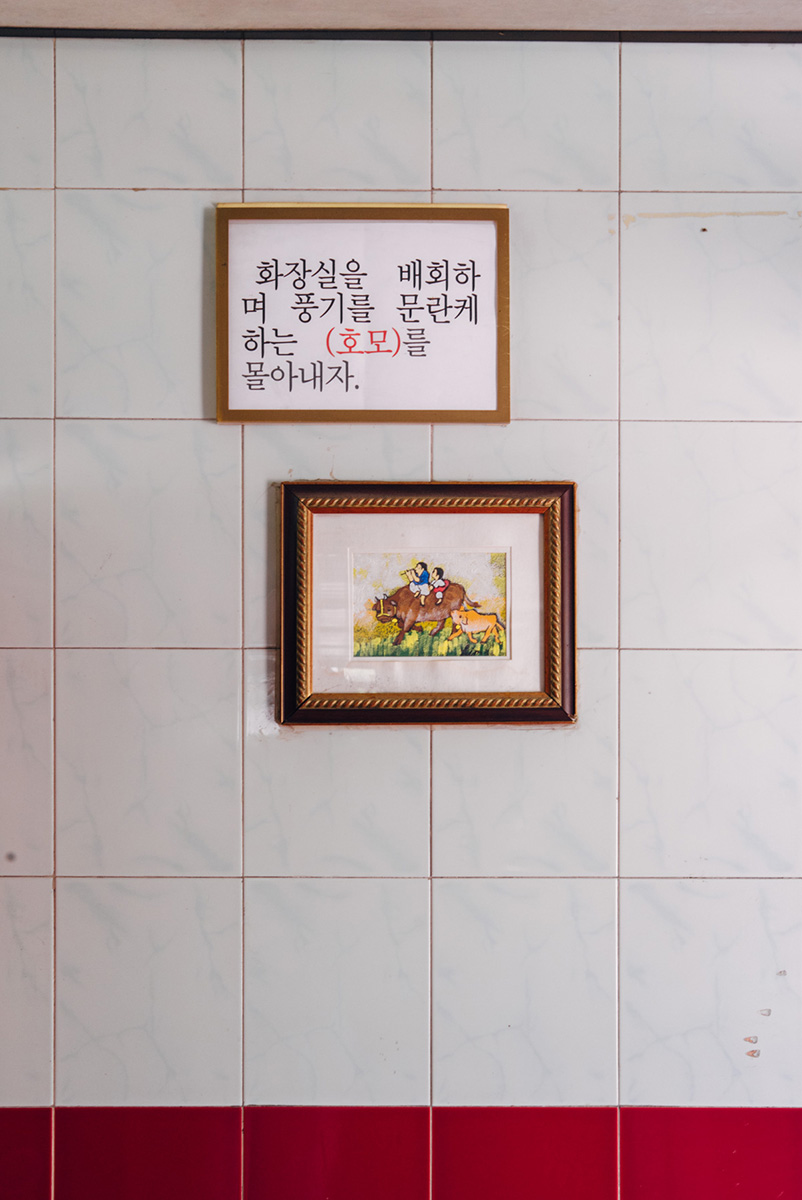
▲ 2012.7.12. @탑골공원 화장실
종로3가 게이커뮤니티의 형성
김대현 (한국게이인권운동단체 친구사이 운영위원, 역사문제연구소 연구위원)
1. 탑골공원
탑골공원은 1897년 한국인이 세운 최초의 근대식 공원이다. 공원의 이름은 경내에 있는 국보 제2호로 지정된 원각사지 10층 석탑에서 유래한다. 1910년 일제에 의해 대한제국이 망한 후 1919년 일제에 대한 민족적 저항인 3.1운동이 일어났을 때, 이곳 탑골공원에서 기미독립선언서가 낭독되었다. 대한민국 정부 수립 이후 1960년 4.19혁명이 일어났을 때, 탑골공원에 세워졌던 이승만 대통령의 동상은 그가 하야한 4월 26일 철거되었다. 이처럼 탑골공원은 한국 근현대사를 통틀어 민족적 정체성을 상징하는 공간으로 자리잡았다.
한편 이곳 근방은 오늘날의 게이·트랜스젠더 여성에 해당되는 비규범적 젠더·섹슈얼리티 실천을 수행한 사람들이 모여든 공간이기도 했다. 그들은 스스로를 종종 일제 강점기 유명한 친일파 여성이었던 배정자에 비유하였는데, 이는 자신들을 민족의 규범적 주체로부터 벗어난 존재로 감각하였음을 드러낸다.[1] 과거의 성소수자들은 이곳 탑골공원의 탑 주변을 맴돌면서 하룻밤 섹스 상대를 찾고는 하였는데, 이를 일컬어 ‘탑돌이’라 불렀다. 이러한 행동은 이곳에 함께 존재했던 거리 성매매여성의 그것을 본딴 것이다. 실제로 이곳 일대의 종로3가 지역은 서울시내의 유명한 성매매집결지이였다. 이곳에서 과거 게이·트랜스젠더 여성과 성매매여성은 서로 비슷한 형태의 사회적 낙인을 공유했다. 즉 정상가족 내에서 섹스를 영위할 것 같지 않은 비규범적 존재에 대한 낙인이었다.
게이·트랜스젠더 여성이 자신을 가리키는 비어 가운데 하나로 ‘보갈’이라는 말이 있다. 이 말은 성매매여성을 가리키는 비칭인 ‘갈보’를 뒤집은 것이다. 이 두 단어의 유사성은 앞에서 보았듯이 우연이 아니다. 한국의 게이들은 지금도 게이바에 앉아 “나 오늘 안팔렸어”라는 말을 사용하기도 한다. 이 말은 자신을 은연중 성매매여성에 비유하는 의미를 담고 있다. 이런 말을 쓰는 이성애자 남성을 거의 찾아볼 수 없다는 점에서, 이런 말들은 그 자체로 이성애와 비이성애 사이의 구조적 차이를 드러냄과 동시에, 게이·트랜스젠더가 성매매여성과 은유적으로 유사한 형태의 비규범적 여성성을 수행해온 이들임을 드러낸다.[2] 이러한 맥락을 잘 드러내주는 한국영화로 이재용 감독의 <죽여주는 여자>(2016)가 있다.
2. 파고다극장
탑골공원의 이름을 딴 파고다극장은 1960년 이곳에 세워졌다. 시간이 흘러 1970년대로 접어들면서 이곳은 낙후된 시설을 가진 동시상영관이 되었고, 오늘날의 게이·트랜스젠더 여성에 해당하는 사람들이 몰려들어 섹스 파트너를 찾고 섹스를 수행하는 공간으로 거듭났다. 파고다극장은 1970년대 이후 종로3가의 게이업소 인프라를 만드는 데 구심점의 역할을 했으며, 당대 대중오락잡지에서 ‘P극장’, ‘P싸롱’으로 불리면서 비규범적 젠더·섹슈얼리티를 수행하는 당사자들의 거점으로 암암리에 회자되었다. 이곳은 2002년 마침내 폐관되었다.[3]
이곳에서의 섹스는 때때로 경찰의 단속에 내몰리기도 했지만, 때로는 경찰의 비호 아래 수행되기도 했다. 이곳뿐 아니라 군사독재 시절 종로3가의 유흥업소들은 대개 경찰이나 조직폭력배의 사적인 비호와 결탁 아래 자신들의 영업을 이어나가고는 했다.[4] 이러한 공간의 역사를 잘 드러내주는 한국영화로 홍민키 감독의 <낙원>(2023)이 있다.
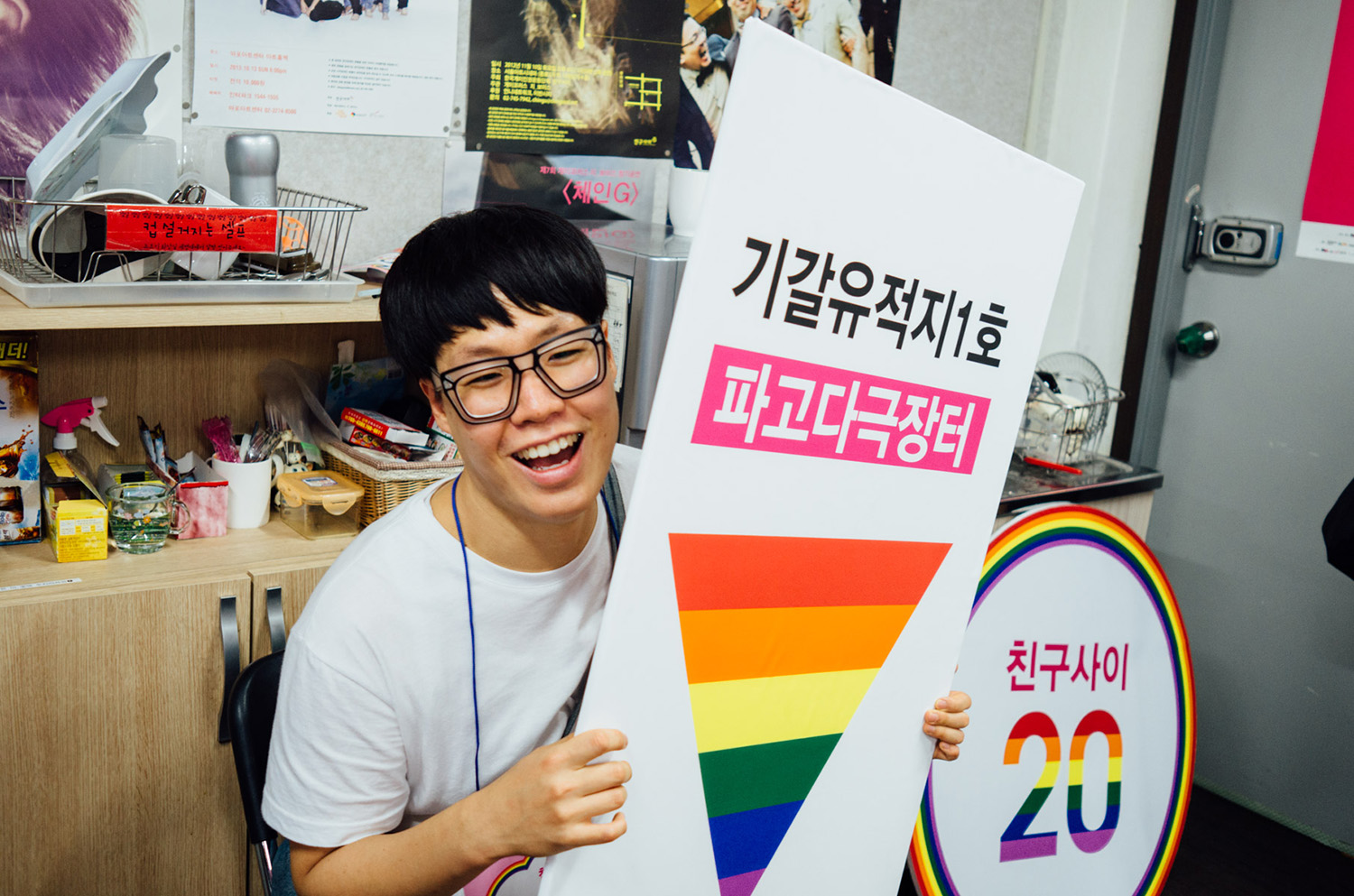
▲ 2014.8.30. @친구사이 사무실
3. 낙원상가
낙원상가는 한국 최대의 악기 전문상가이다. 1967년 낙원상가 건물과 더불어 탑골공원 주변에 파고다 아케이드가 세워졌는데, 악기 전문점들이 파고다 아케이드에 입점하기 시작했다. 그러다 1979년 파고다 아케이드가 철거 결정되면서 그곳의 점포들이 1980년대부터 낙원상가로 이주해 오늘에 이른다.
이곳에 악기 전문상가가 성업한 이유는, 당대 유흥업소에서 흥을 돋우던 서비스 노동자들이 주로 밴드 연주자들이었기 때문이다. 실제로 유흥업소는 한국 KPOP이 성장한 산실과도 같은 곳이었고, 그 중 대표적인 것이 미8군의 R&R, 즉 ‘위안’무대였다. 1950년대부터 미군 부대 주변은 미군을 대상으로 한 유흥업소가 성업했고, 이 곳의 무대에는 연습을 거친 전문 연주자와 가수, 댄서들이 올랐는데, 이 때 이들을 훈련하던 업체들은 오늘날 KPOP 연예기획사 및 연습생 시스템의 원류와 같다.[5] 이 당시의 풍경을 잘 그려낸 한국의 다큐멘터리로 김대현 감독의 <다방의 푸른 꿈>(2015)이 있다.
한국 유흥업소의 주요 구매자였던 미군들은, 1965년 한일기본조약 체결 이후 한국을 방문한 일본인 관광객으로 교체되었고, 그 다음으로 한국인 남성들이 주요 구매자로 자리잡았다.[6] 종로3가 최초의 게이 대상 업소인 ‘심’이 1974년 세워졌는데, 그곳을 연 동업자 중 한 사람이 일본인이었다.[7] 이처럼 종로3가의 게이업소들은 당대 유흥업소의 흐름과 연동되어 있었다. 또한 이러한 예들은 과거 게이·트랜스젠더에 해당하는 사람들이 민족의 규범적 주체는 아니었을지언정, 그들에게도 탈식민 국가에 사는 사람으로서 제국·식민 구조, 냉전 구조의 영향이 작용하였음을 알려주는 증거다.
한국을 둘러싼 초국적 성매매 네트워크는 지금도 작동 중이다. 현재는 동남아시아 지역의 성매매여성들이 ‘연예인 비자(E-6)’를 받고 한국 유흥업소에 유입되는 사례가 늘고 있다. 이를 다룬 한국 다큐멘터리로 이고운 감독의 <호스트네이션>(2016)이 있다.
4. 프렌즈
낙원상가와 게이업소와의 관계는 또 있다. 1980년대 이후 유흥업소의 대세가 밴드에서 가라오케로 바뀌면서, 유흥업소를 채우던 연주자의 자리가 좁아지기 시작했고, 따라서 이곳 일대의 악기 창고가 비게 되었다. 악기 창고는 대체로 월세가 저렴했고, 용도를 잃은 악기 창고 자리에 속속 게이업소들이 들어서기 시작했다. 그곳들은 주로 지하에 위치해있었고, 손님들이 어떤 사람들인지 들키고 싶지 않았던 업소의 입장에서는 최적의 장소였다.[8] 더구나 한국은 1999년까지 자정 이후 심야영업이 불법이었고,[9] 그랬기에 게이업소를 포함한 한국의 유흥업소들은 대개 자정 이후 문을 걸어잠그고 불법으로 영업을 이어나갔다.
게이업소인 프렌즈는 2003년 개업하였고, 2004년 이곳에 자리잡아 오늘에 이른다. 프렌즈가 독특한 게이업소인 이유는, 당시 종로3가 게이바 중 최초로 1층에 자리잡았고, 무지개 깃발을 내걸었다는 데 있다. 1층에서의 영업과 무지개 깃발을 내거는 것에 대해, 개업 당시 이곳을 찾은 손님들의 많은 만류가 있었다. 게이업소가 내부가 보이는 통유리를 지닌 채 지상으로 올라오기까지는 그러한 우여곡절이 있었다.
5. 친구사이 사무실
돈의동 쪽방촌은 가난한 사람들이 모여사는 곳이다. 이곳의 공간 중 일부에 과거 동성애자 남성들이 모여 섹스를 하는 ‘돈광’이 있었다.[10] 이성애자의 공간이 그곳을 드나드는 동성애자에 의해 동성애적 공간으로 거듭나는 것은 으레 있는 일이다. 그 중 대표적인 예가 1990년대에 출현한 게이 사우나, 즉 ‘찜방’이었다.[11]
그런 업소들이 모여있는 곳에 한국게이인권운동단체 친구사이의 사무실이 있다. 친구사이는 1994년 설립되었고, 1998년 이곳 종로3가로 사무실을 이전했으며, 2006년 현재의 이곳에 자리잡았다. 친구사이가 종로3가에 사무실을 둔 이유는, 게이커뮤니티를 대상으로 활동하는 단체는 모름지기 기존의 게이들이 존재하는 곳에 있는 편이 합당하다는 판단에서였다.
친구사이는 기존에 존재하는 게이커뮤니티 외에, 앞으로 만들어가야 할 게이커뮤니티에도 관심을 기울인다.[12] 친구사이 사무실은 친구사이가 연대하는 많은 단체들의 회의가 수시로 열리는 곳이다. 친구사이를 비롯한 한국의 성소수자인권운동은 한국의 노동운동, 인권운동, 여성운동, 장애운동과 긴밀히 연대해왔다. 이러한 역사를 드러내는 한국의 영화로는 이동하 감독의 <위켄즈>(2016)를 들 수 있다.
2022년 5~6월 차별금지법 제정을 촉구하는 차별금지법제정연대의 활동 가운데, 수십일 동안 곡기를 끊은 차별금지법제정연대 소속 활동가 두 명 중 한 명이 바로 친구사이에 소속된 게이 활동가였다.[13] 이것은 다른 나라와 구별되는 한국 게이인권운동과 게이커뮤니티의 역사와 위상을 말해주는 사건 가운데 하나라 할 수 있다.
[1] 김대현, 「1980~90년대 게이 하위문화와 대안가족의 구성 : 제도적 이성애와의 관계를 중심으로」, 『구술사연구』 12(1), 한국구술사학회, 2021, 75~76쪽.
[2] 김대현, 「게이와 페미니즘」, 『문화/과학』 104, 문화과학사, 2020, 144~149쪽.
[3] 「퀴어영화제 ‘파고다극장의 유언’ 13일 개막」, 『씨네21』 2003.3.5.
[4] 김대현, 「1980~90년대 게이 하위문화와 대안가족의 구성 : 제도적 이성애와의 관계를 중심으로」, 『구술사연구』 12(1), 한국구술사학회, 2021, 79~80쪽.
[5] 김대현, 「워커힐의 ‘디바’에게 무대란 어떤 곳이었을까 : 1960~70년대 유흥업과 냉전시대의 성문화」, 오혜진 기획, 『원본 없는 판타지 : 페미니스트 시각으로 읽는 한국 현대문화사』, 후마니타스, 2020, 134~139쪽.
[6] 박정미, 「쾌락과 공포의 시대 : 1980년대 한국의 ‘유흥향락산업’과 인신매매」, 『여성학논집』 33(2), 이화여자대학교 한국여성연구원, 2016, 41쪽.
[7] 「역사 속의 진실 : 이것이 한국 최초의 이반업소였다!」, 『보릿자루』 25, 보릿자루 편집부, 2001.2.29, 36~37쪽.
[8] 「「전설의 명인을 찾아서」 인터뷰록 원본」, 『선게이서울 : 지보이스 스토리북 창단 17주년 특별판』, 한국게이인권운동단체 친구사이, 2019, 76~77쪽.
[9] 「이건 이렇게 : 심야영업 제한 폐지」, 『경향신문』 1998.9.24, 7면.
[10] 김경민, 『겨울 허수아비도 사는 일에는 연습이 필요하다』, 도서출판 성림, 1993, 117쪽.
[11] 조성배, 「게이 남성의 소비 공간과 몸의 정치학」, 연세대학교 문화학협동과정 석사학위논문, 2003, 4장 참조.
[12] 「게이커뮤니티 운동 약사, 1995~2000」, 『친구사이 소식지』 66, 한국게이인권운동단체 친구사이, 2015.12.
[13] 「차별금지법 제정 쟁취를 위한 46일 농성&단식투쟁 마무리 집회」, 『친구사이 소식지』 143, 한국게이인권운동단체 친구사이, 2022.5.
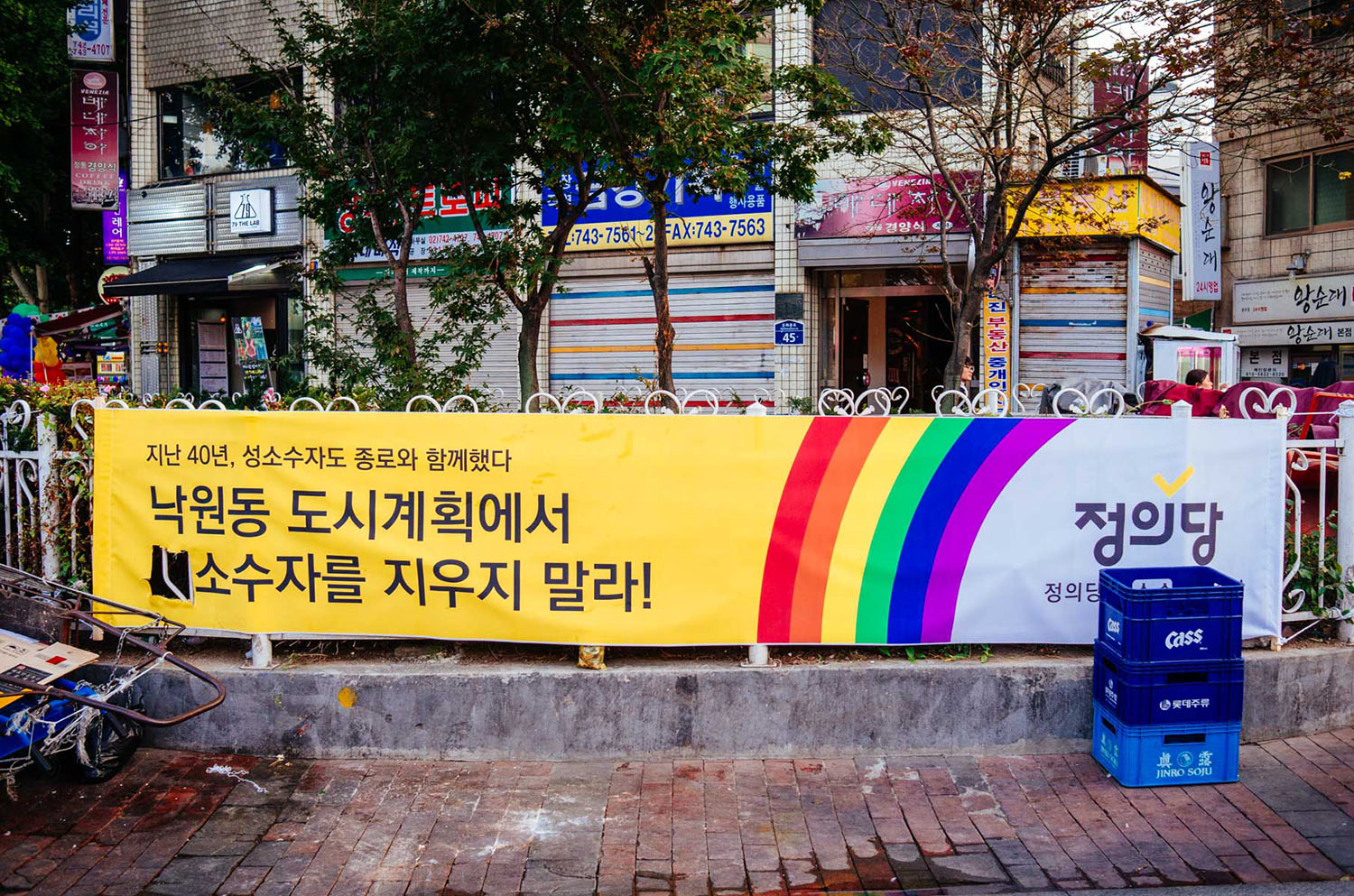
▲ 2017.10.14. @돈화문로11길
The Formation of the Gay Community in Jongno 3-ga
Kim, Daehyun(Korean Gay Men’s Human Rights Group Chingusai (“Between Friends”), Steering Committee Member
/ The Institute for Korean Historical Studies, Research Fellow)
1. Pagoda Park
Pagoda Park is the first modern park built by Koreans in 1897. The park takes its name from the Wongaksa Pagoda that stands on the site. After the collapse of the Korean Empire by the Japanese in 1910, the 1919 Declaration of Independence was read here in 1919 during the March 1st Movement, a national resistance to Japanese rule. When the April 19 Revolution took place in 1960 after the establishment of the Korean government, the statue of President Syngman Rhee erected in the park was removed on April 26, the day he resigned. As such, the park has become a symbol of national identity throughout Korea's modern and contemporary history.
It was also a gathering place for people who practiced non-normative gender and sexuality, the equivalent of today's gay and transgender women. They often compared themselves to Bae Jeongja (裵貞子), the famous pro-Japanese women of the Japanese occupation, showing that they perceived themselves as outside the nation's normative subjects. In the past, gay men and transgender women would circle the pagoda in Pagoda Park looking for a one-night stand, a practice known as "topdolee". This behavior mimicked that of the street prostitutes who coexisted here. In fact, the area around Jongno 3-ga was a famous meeting place for prostitution in Seoul. In the past, gay and transgender women and prostitutes shared a similar form of social stigma: the stigma of being non-normative, unlikely to have sex within a normal family.
One of the slang terms gay and transgender women use to describe themselves is the "bogal". It's an inversion of the obscene term "galbo," which was used to refer to women in prostitution. The similarity between the two words is not accidental. Gay men in South Korea still use the phrase "I'm not sold today" when sitting in a gay bar. This phrase implicitly compares them to prostitutes. Since it is rare to find a heterosexual man using this phrase, this in itself reveals the structural difference between heterosexuality and non-heterosexuality, while also revealing that gay and transgender people are the ones who have been practicing a form of non-normative femininity that is metaphorically similar to that of a prostitute. A Korean film that exemplifies this is E J-yong's The Bacchus Lady (2016).
2. Pagoda Theater
The Pagoda Theater, named after the Pagoda Park, was built here in 1960. Over time and in the 1970s, it became a double feature movie theater and a place where many of today's gay and transgender women flocked to find sex partners and have sex. The Pagoda Theater played a key role in creating the infrastructure of gay venues in Jongno 3-ga from the 1970s onward, and was referred to in the raunchy magazines of the time as the "P-theater" and "P-salon," and implicitly as a base for parties performing non-normative gender and sexuality. It was finally closed in 2002.
Sex was sometimes practiced here under the aegis of the police, although it was sometimes the subject of police raids. During the military dictatorship, brothels in Jongno 3-ga and elsewhere often operated with the personal support and collusion of police or gangsters. A Korean film that reveals the history of these places is Minki HONG's Paradise (2023).
3. Nakwon ("Paradise") Shopping Center
Nakwon Shopping Center is the largest musical instrument mall in Korea. In 1967, Pagoda Arcade was built around Pagoda Park along with the Nakwon Shopping Center building, and stores specializing in musical instruments began to open in Pagoda Arcade. However, in 1979, it was decided to demolish Pagoda Arcade, and the stores there moved to Nakwon Shopping Street in the 1980s.
Musical instrument stores thrived here because many of the service workers who entertained in the brothels of the time were band players. In fact, the brothels were the birthplace of K-POP, especially the R&R (Rest & Recreation) or "comfort" stage of the U.S. Eighth Army. Beginning in the 1950s, entertainment venues for American troops sprang up around U.S. military bases, and the stages were filled with trained professional musicians, singers, and dancers whose training companies were the progenitors of today's K-POP agency and trainee system. A great South Korean documentary that captures the scene is Daehyun Kim's Try to Remember (2015).
American soldiers, who were the main customers of Korean nightclubs, were replaced by Japanese tourists visiting Korea after the signing of the Treaty on Basic Relations between Japan and the Republic of Korea in 1965, followed by Korean men. The first gay bar in Jongno 3-ga, "Sim", opened in 1974 and one of its partners was Japanese. Thus, gay bars in Jongno 3-ga were linked to the flow of the Korean sex industry at that time. These examples also show that gay and transgender people may not have been the normative subjects of ethnicity in the past, but as people living in a postcolonial country, they were also under the influence of imperial-colonial structures, Cold War structures.
The transnational sex industry networks that surround South Korea continue to operate today. Currently, prostitutes from Southeast Asia are increasingly entering South Korea's brothels on "entertainer visas" (E-6). A Korean documentary about this is Host Nation (2016), directed by Goun Lee.
4. Friends
There is another connection between the Paradise Shopping Center and gay bars. Beginning in the 1980s, as the popularity of entertainment venues shifted from bands to karaoke, the space for the musicians who used to fill the venues began to shrink, resulting in the emptying of music instrument warehouses in the area. Music warehouses were generally cheap to rent, and gay bars began to pop up in their empty spaces, which were often underground and perfect for establishments that didn't want their customers to know who they were. In addition, late night business was illegal in South Korea until 1999, so most of the country's adult entertainment industry, including gay bars, kept their doors locked and operated illegally after midnight.
Friends, a gay bar, opened in 2003 and moved to its current location in 2004. What makes Friends unique is that it was the first gay bar in Jongno 3-ga to be located on the first floor and to fly a rainbow flag. When it first opened, there were many complaints from customers about its ground-floor location and rainbow flag. It took some twists and turns before the gay bar was moved to the ground floor with glass windows to see inside.
5. Chingusai Office
Doneui-dong shantytown is a place where poor people gather. Some of the rooms here used to be "Don-gwang," where homosexual men gathered to have sex. It is not uncommon for heterosexual rooms to be turned into homosexual rooms by the homosexuals who frequent them. A typical example was the gay sauna - "jjimbang" - that appeared in the 1990s.
One such facility is the office of the Korean Gay Men's Human Rights Group Chingusai. The organization was founded in 1994, moved to Jongno 3-ga in 1998, and settled in its current location in 2006. The organization chose Jongno 3-ga because it believes that it is better to be in a place where there is an existing gay community than to be an organization that targets the gay community.
In addition to the existing gay community, Chingusai is also interested in the gay community that needs to be created in the future. Chingusai's office is where many of the organizations that Chingusai has been in solidarity with meet from time to time. The LGBT rights movement in South Korea, including Chingusai, has been closely allied with the labor, human rights, women's rights, and disability rights movements. One of the most recent South Korean films to reveal this history is Lee Dongha's Weekends (2016).
In May-June 2022, during the activities of the South Korean Coalition for Anti-Discrimination Legislation, which called for the enactment of an anti-discrimination law, one of the two activists of the coalition who went on a hunger strike for dozens of days was a gay activist who was the secretary general of Chingusai. This is one of the cases that speaks to the history and status of the gay rights movement and the gay community in Korea, which is different from other countries.
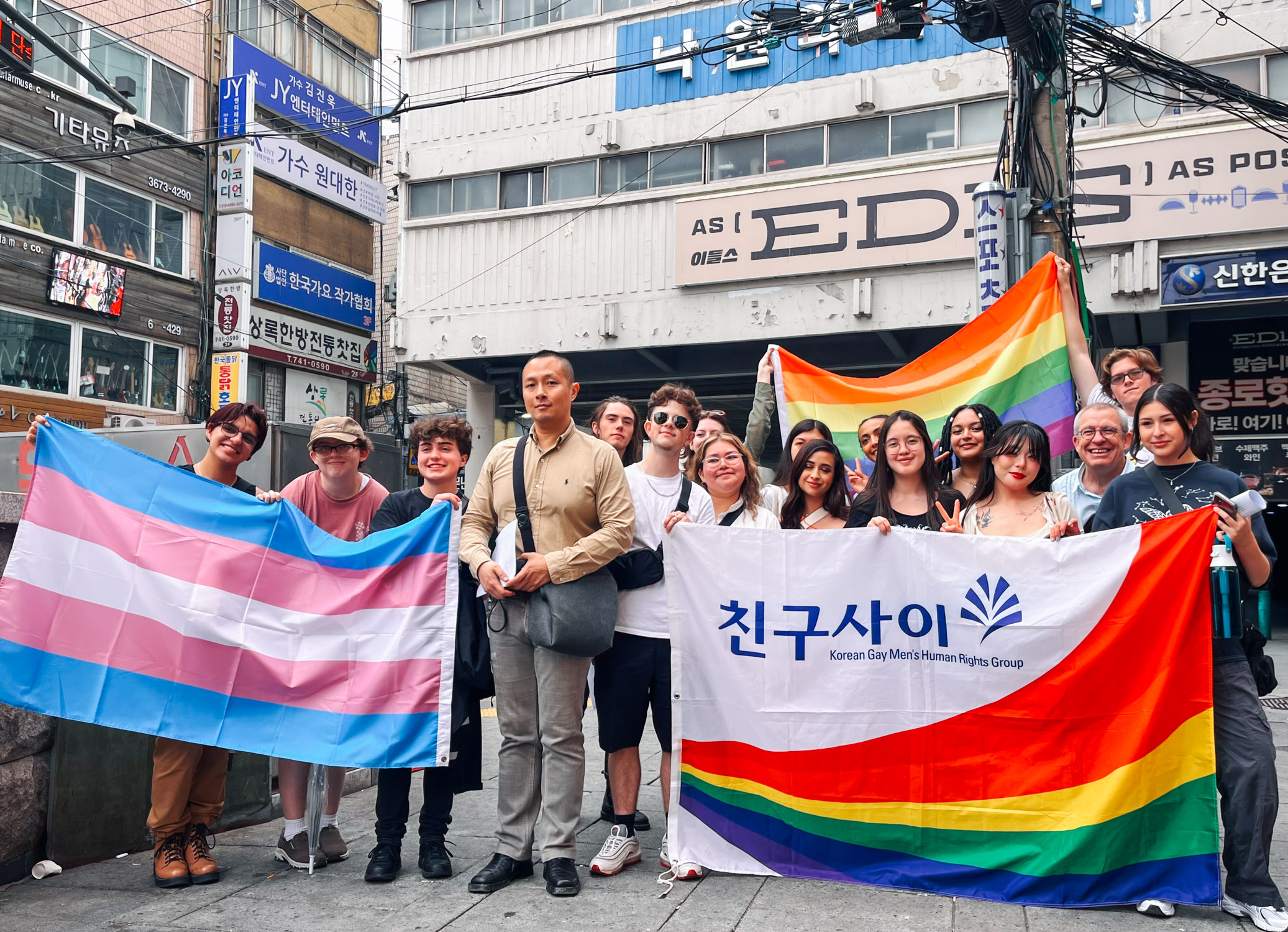
▲ 2024.5.26. @낙원상가



